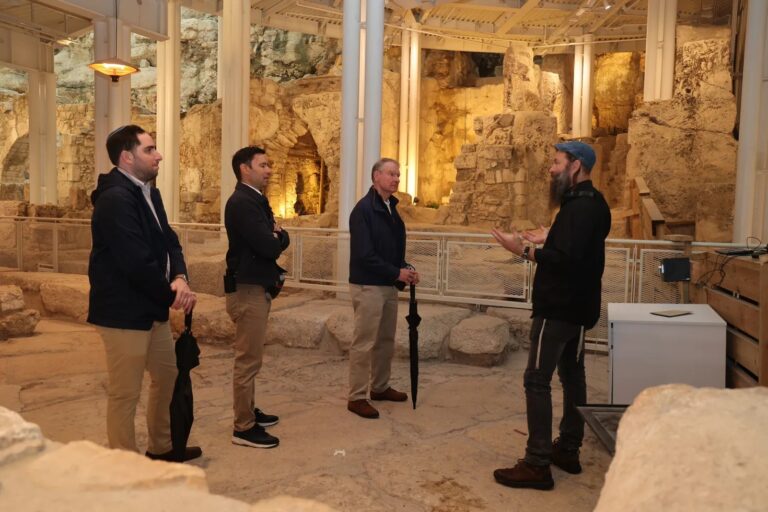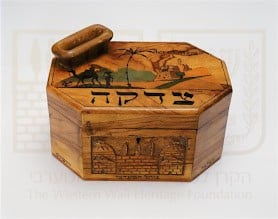Parashat Kedoshim – 5782
Rabbi Shmuel Rabinowitz, Rabbi of the Western Wall and Holy Sites
This week’s Torah portion opens with the call, “You shall be holy!” This commandment obligates us to examine what holiness is. Is it a feeling? An experience? The explanation for this commandment to be holy is, “for I, the Lord, your G-d, am holy.” If holiness is a divine trait, we must figure out how a person can become holy like G-d.
Many definitions have been given for the term “holy.” Among the most famous of those who researched this was Rudolf Otto, a German philosopher and theologian, who wrote a famous book called “The Idea of the Holy” where he tried to define the term and the manner in which holiness is experienced by man. In his opinion, holiness is a combination of two forces: fear of the sublime, expressed at a low level simply as fear and a higher level as a sense of glory and splendor, and the longing to get closer to the thing because of its wondrous charm. Others described holiness as an other-worldly, lofty and sublime facet. There could be truth in these definitions, but it is hard to connect them with the commandment “You shall be holy!” How can a person not only be exposed to holiness, and not only yearn for it, but become holy himself?
The key to grasping the concept of holiness in Judaism is the understanding that holiness is indeed a divine trait, and therefore, devotion to G-d is the means to attaining holiness. In Chazal literature, we find several ways in which devotion to G-d can be actualized and thus make a person holy.
In the Babylonian Talmud, the sages wondered about man’s ability to be devoted to G-d:
But is it possible to cleave to the Divine Presence? Isn’t it written: For the Lord your G-d is a devouring fire!
G-d is compared to fire. Can someone cleave to fire without getting burned? How can a physical man be close to G-d?
And the sages answer:
Rather, this verse teaches that anyone who marries his daughter to a Torah scholar, and one who conducts business [perakmatya] on behalf of Torah scholars, and one who utilizes his wealth to benefit Torah scholars with his property in some other way, the verse ascribes him credit as though he is cleaving to the Divine Presence.
(Tractate Ketubot 111)
Elsewhere, the sages ask a similar question and give a different answer:
But is it actually possible for a person to follow the Divine Presence? …Rather, the meaning is that one should follow the attributes of the Holy One, Blessed be He. Just as He clothes the naked…so too, should you clothe the naked. Just as the Holy One, Blessed be He, visits the sick…so too, should you visit the sick. Just as the Holy One, Blessed be He, consoles mourners…so too, should you console mourners. Just as the Holy One, Blessed be He, buried the dead…so too, should you bury the dead.
(Sota 14)
The sages of the midrash propose a third way of being devoted to G-d:
But is it possible for flesh and blood to go up to the Heavens and to cling to the Divine Presence?… But rather, the Holy One, blessed be He, from the very beginning of the creation of the world, only occupied Himself with plantation first… You also, when you enter into the land, only occupy yourselves with plantation first.
(Vayikra Rabbah 25)
We have, therefore, three means of devotion to G-d: connection to the Torah, acts of gemilut chassadim (loving-kindness), and being occupied with developing the world. These are all different expressions of divine holiness. The Torah is the word of G-d to humanity – the manner in which man is exposed to the eternal values of the Creator of the Universe; Gemilut Chassadim, thinking of others and assisting the weak, is walking the path of G-d; and developing the world, what the sages of the midrash demonstrate through the example of planting fruit trees, makes man a partner of G-d’s in the existence of the world.
It is therefore no surprise that under the title of “You shall be holy” in this week’s parasha, we find a very varied list of commandments: respect for parents, keeping Shabbat, the prohibition of idolatry, various commandments to assist the poor, the commandment to judge fairly and favorably, the prohibition to hate others, to respect one’s elders, etc… Indeed, there are many ways to attain holiness. In every commandment a person fulfills, whether it is between the person and G-d, between one person and another, or a commandment in which the person partners with G-d in developing the world – in each of these ways the person is being devoted to G-d and thus becoming holy.
In Judaism, holiness is not an experience; it is an action – says Jewish researcher Steven Kepnes. A person can be holy when he follows G-d’s ways, connects to the Torah, performs acts of loving-kindness with others, and acts on behalf of the world’s existence.









